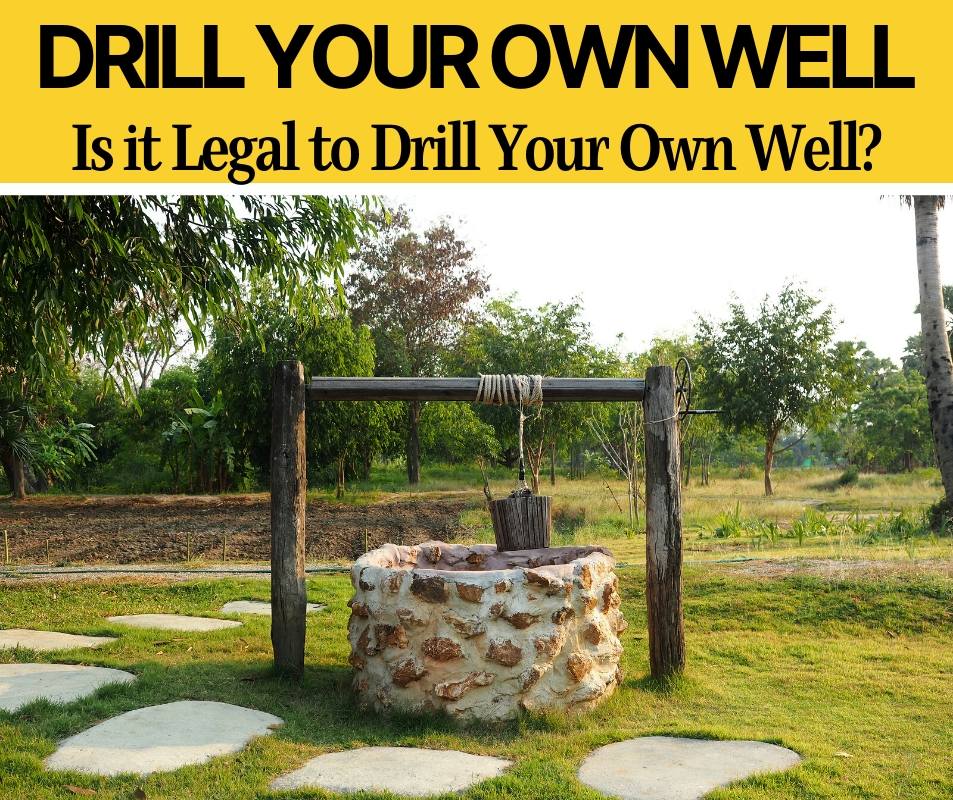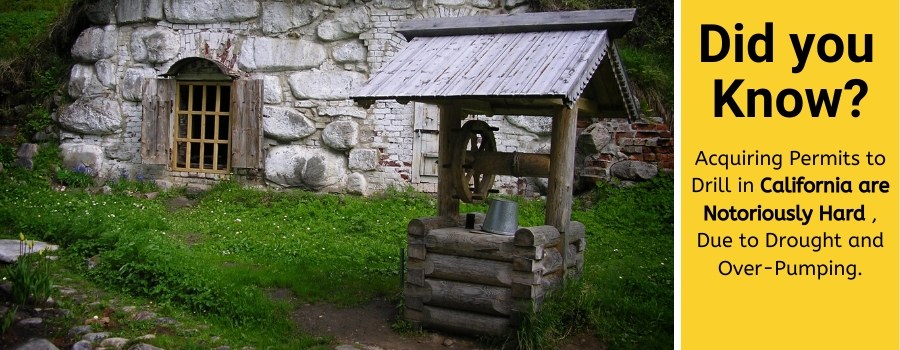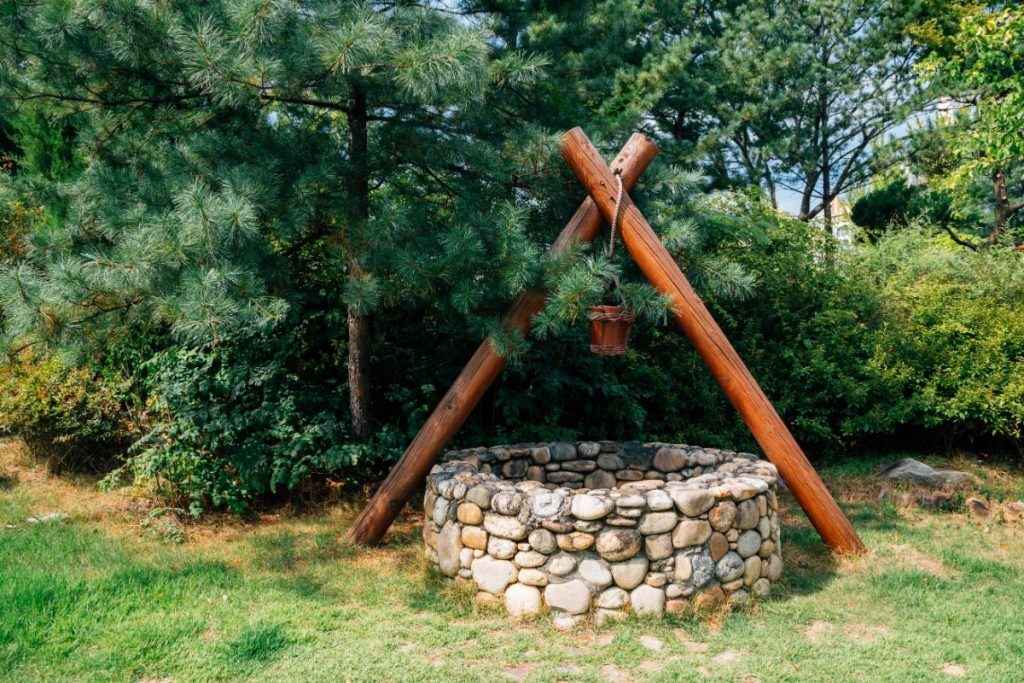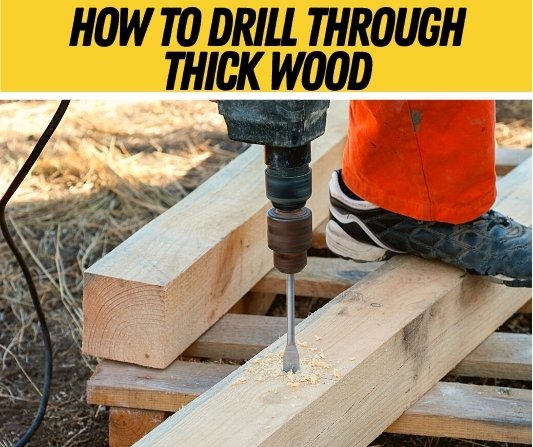 Perhaps you would like to live more off the grid?
Perhaps you would like to live more off the grid?
Or is your property simply not connected to a water supply?
Maybe you are just fed up with the over-chlorinated, polluted tap water?
A lovely fresh water supply is beneficial for everyone and drilling a well yourself can not only save money, but also time and a whole load of stress.
Is it Legal to Drill your Own Well?
Yes It’s legal to drill your own well (except in California), but you probably are going to need a permit. You can legally drill a well anywhere on your own property. It depends on which state you live in as how easy the process of building your own well is going to be. The further West you move, the harder it becomes. Subject to local state legalities you may need authority approval through licenses or permits, whilst other states allow to drill wells with barely any permits.
However, if all are done correctly, anyone can do it – even those in urban areas! Whilst remaining no easy feat, DIY-ing your own water supply may be the answer to your problems, providing a cheaper alternative to other water supplies.
To avoid any confrontations with law, research and knowledge of your plot is necessary before you start drilling. Separate state legislation leads to differing problems regarding law, authority and topography. This article will help, not only display concerns everyone may have with regard to drilling their own well, but will also delve into specific states and their corresponding legislation. The aim is to summarise different states’ stance on the topic; we did the boring reading of the legislature so you don’t have to!

Can You Drill A well Anywhere & Stuff You should be Aware of!
Planning is key when it comes to creating your own water well. Indeed, this accounts for blockages faced both legally and by third party obstructions. Primarily, for instance, permission or permits are needed across a number of states and seeking this from local municipalities is important before drilling commences. Local geological offices and health departments are your points of contact for such permit inquiries. Once you’ve got the legal bit out of the way, you may now need to put some thought into what sort of well you want and most importantly – where?
Where you want to dig your well will determine how functional and useful your well will be (for a helpful how-to click here). Avoidance of third party obstructions such as broadband wires, gas pipes, electrical wires and tree roots are all important to allow safe burrowing of your pipe into the aquifer (underground water supply). Additionally, you have to consider the type of land you live on. Clay, soil, sand or rock all come with a differing set of issues when burrowing your hole and with the knowledge of this you can adequately prepare for eventualities better if you know what ground you are dealing with. Unfortunately, if you have bedrock or granite laying under your well site, you will struggle to perform a DIY drill and instead might have to opt for a professional burrow. Indeed, with all well drilling concerns over contamination should be a priority and choosing the correct location to allow for safe drinking water needs to take this into consideration also.
Can you dig a well in your backyard
This again depends on which state you reside in. For those in the North and South (Maine, Florida and Texas), state legislation generally allows you to tap into a well in your backyard with little restrictions, and with little regard for other wells around you. So as long as you want to, you can set up a drilled well and pump water till your heart’s content! Alternatively as you move West, states enforce distance rules and hard to acquire permits. This means it really depends how large your backyard is for how easily installable a drilled well would be to put into place. Due to over-pumping California has made it hard to acquire permits for drilling your own well meaning all those well ideas unfortunately may be pipe-dreams (see what i done there?).
Can you dig a well in a city
Due to distance restrictions mentioned previously about wells, there are certainly further complications if you were intending on creating a well in a city. Space to even provide enough distance alone is an issue. Alongside this, you again fall into the pot-luck aspect of drilling wells whereby you need to learn the lay of the land to avoid even more human infrastructural or chemical obstacles. Not only do you have to have increased awareness of obstructions like gas pipes and electrical wires like in towns or rural areas, but furthermore, sewers, underground transport systems or other pollutants could cause issues as well. This means even more care for planning is certainly needed for drilling a well in a city. Regardless of the obstacles that need to be observed, creating a well in a city is possible, with many able to do this themselves.
Is it legal to drill a well next to neighbours?
Again, we have to look at state specific protocol here. However, what is interesting, generally after being granted the permit and applying the Reasonable Use rule, more often than not it is perfectly fine to drill a well next to your neighbours. There are numerous reports of water stealing from existing neighbours well reserves (particularly in Texas). But the Reasonable Use rule, often known as the American Rule, exists to allow unlimited extraction yet stop excessive or unfair abuse of water sources. In the states that allow well drilling it’s fair game as to who taps the best source of water as long as it doesn’t damage other wells or aquifer systems.
How deep can you Drill?
Provided all your permits are all verified, or you just live in a state that grants you immediate access, you can now start thinking about what sort of well you would like. If you’ve done your further research you would be aware of where exactly in the earth that sweet, sweet oasis is laying. If not, drilling till you hit water also works, so I wouldn’t worry about it. Again the answer to this question changes on a state by state basis but as a general rule of thumb, you tend to want to drill your well down till you hit that groundwater basin supply. This can be anywhere from 20ft – 800ft. This however is subject to change depending on which state. For instance, digging deeper in Florida just results in saline water, whereas there are reports of drilled wells in Oregon which go down 800ft to a fresh groundwater source. On average you would be looking at about 20-50ft down before hitting your groundwater source normally. With most states requiring a minimum of 20ft of casing used in drilled wells to ensure no surface contamination. Other nearby wells will access the water at a certain level, it’s always worth asking your neighbour how deep their well is for reference.
Comparison between different states
As it is with most things this comes down to different states having different rules. Ultimately, you will find that the rules contrast across the board. What is interesting, with the exception of California, all states allow you to dig a well on your property, regardless of location, in some way or another. The level of strictness in states scales from not being allowed at all in California, to a necessary permit in North Carolina, to very few limitations in Florida. Because of this it would be essential to check the legalities surrounding your own state before you whip out your equipment.
North Carolina
Yes, It’s legal to drill your own well in NC. In North Carolina you have to obtain a permit from the Environmental Health department of the state statute. A permit will be granted if the proposed well is properly located, constructed and maintained by the individual. Costs for the permit vary from county to county, but all counties have to abide by state rules regarding 100ft distance from septic tank and 25ft distance between the well and your house. Once permit and location have been settled, you are free to drill your well however you like.
California
California is one of the stricter states with regard to drilling your own well. Due to drought and over-pumping, they have had to clamp down on personal well drills. Well owners need to get a permit from Local Environmental health agencies and follow the strict rules set out by the Water Board. In California, private wells must be constructed by a licenced contractor and cannot be done by yourself. Strict protocol surrounding contamination must also be met. This is by far one of the harder states to obtain your own private well.
Florida
Yes, It’s legal to drill your own well in Florida. As one of the more lenient states around the country, drilling wells in Florida is pretty easy. No permit is needed for personal use wells, whilst the only restriction on the construction of these wells is that the pipe can be no wider than 2” in diameter. ‘Self-Wells’ as they are known in Florida can be built anywhere in the city or your garden, with little regulations over who does this. However, in Florida the topography seems to be your biggest concern. Striking a balance between shallow drilling – risking water contamination from ground level – and deep drilling – risking hitting saline water from sea water – is something you need to consider.
Maine
Yes, It’s legal to drill your own well in Maine. Maine is similar to North Carolina whereby the state recommends a 100ft distance from any septic tank (including your neighbours) and at a safe distance from your own house and any surrounding buildings. However in Maine, there are no regulations for personally drilling your own well. Anyone can do it for personal use, and only need a permit when it goes beyond this. A specific regulation in Maine itself is the recommendation from the Environmental Board, whereby the driller should reach up to 10ft into the bedrock where the well is being constructed and this hole sealed accordingly. This recommendation is made in other states but in Maine they specifically recommend this during construction. A useful nuance to know for sure.
Oregon
Yes, It’s legal to drill your own well in Orgeon.However Due to the complexity of Oregon’s geology and topography, the state government here is very strict with regards to drilling wells. You are allowed to gain a permit whereby you can drill a well, but this permit is strict, has numerous nuances and can sometimes be hard to obtain. Once this permit is obtained by an individual, they must adhere to any construction of well drilling within a year or else this permit becomes void. You have got to really, really want this well if you fancy setting one up in Oregon, it’s both pricey and a long procedure here, with the state recommending you contract a well drilling company.
Colorado
Yes, It’s legal to drill your own well in Colorado. Most of the private (domestic) wells in Colorado are ‘exempt’ from administration within their water system, but it is also essential that you obtain a permit for drilling your well. As it is with the rest of the states towards the West, there are restrictions on the construction of wells here. Despite the growing trend, with more than 400 new applications for permits every year, Colorado requires residents to obtain a permit for the State Engineer. This limits the domestic use of wells to 35 gallons per minute, with some smaller than 35 acre properties restricted to in-house well use only.
Texas
100% YES. Texas is up there with the most lenient states. Under the Rule of Capture legal doctrine, it is perfectly legal to set up your own drilled well. This can be done in any fashion as long as it is on your own property and does not need to consider any other implications, including your neighbour. This means in Texas it’s okay to let your neighbours well run dry if it is of beneficial use to yourself. Groundwater in Texas is fair game!
Nevada
Yes, It’s legal to drill your own well in Nevada. In Nevada you are allowed to construct a well for domestic use if it is functioning under 1,800 gallons a day (usually well within a household usage). This means most of the time domestic wells are exempt from the state law. Despite this, well drillers need to file drillings logs with the State Engineer. So whilst domestic wells do not necessarily need permits, you do need to register your domestic well drilling logs to the administration. Since 1981, all well drillers have been required to submit this information to the State Engineer within 10 days after construction of the well.

Is it possible to drill your own well
It is more than possible to drill your own well (outside of California) across the states. Following both common sense and particular state guidelines for location and regulations, you can create a perfectly functioning domestic private well.
Is it feasible to drill your own well by hand
This depends wholly on location. Differing land and geology proves a huge factor here alongside the intensity of potential pollutants. Whilst being possible to drill your own well almost anywhere. For a fully legal, high functioning and safe well, you want to dig deep enough to avoid contaminants, pass legal requirements and obtain a high level of water quality. This means drilling at least 30ft under, which can be tough without heavy machinery if you hit bedrock. For wells less than 30ft you may not only fail to pass legal requirements with regard to your permit, but you also run the risk of water contamination from sewage and pesticides. Indeed the work could be done by yourself, soil and location permitting, it can be a cheaper option. However, depending on the geology of your well and where that water source actually sits, drilling it may not be personally feasible and the need for contractors will more than likely be required. This might make Californians feel slightly less left out!
Despite being less expensive, digging your own well through a technique called driving is much more physically demanding. This technique calls upon the pounding of tubes into the earth until you hit your water supply. This is perhaps more effective for areas with what you would regard as less complicated geology. However, in areas with high rock or clay content digging/driving becomes impossible and drilling is necessary. Short answer here is it depends. Geology of the location of your well remains the biggest sticking point. If suitable ground then yes, but if this ground is unfit for digging then it’s going to be an impossible task. Where it is possible, this option is certainly cheaper.
How do you know when you hit water drilling a well?
Perhaps the easiest way to identify when you hit water with your drill has cuttings containing sand or gravel. These areas usually provide abundant water supplies if they are saturated and extracting appropriate cuttings indicates that you have hit a water supply you can use. This does require constant and careful inspection of your drill cuttings but is the easiest method to identify if you’ve hit water.






